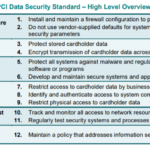In this article, you will explore the dilemma faced by users when it comes to striking a balance between protecting their devices and safeguarding their personal data. Antivirus protection is crucial in today’s digital landscape, where cyber threats are constantly evolving. However, many users have understandable concerns about the amount of access that antivirus software may have to their personal information. Finding the right balance between security and privacy can be a daunting task, but fear not! We will provide you with valuable insights and practical tips to help you navigate this complex terrain. So, let’s dive in and learn how to protect your devices while keeping your personal data secure!
Understanding the Basics of Antivirus Protection
Definition of an antivirus
An antivirus is a type of software designed to detect, prevent, and remove malicious software from computers and other devices. It serves as a defense mechanism against various forms of malware, such as viruses, worms, Trojans, and ransomware. Antivirus programs are essential for maintaining the security and integrity of your device and personal data.
How an antivirus works
Antivirus software uses several techniques to protect your device. It scans files and programs for known signatures of malware and compares them against a database of known threats. Additionally, antivirus programs employ heuristic analysis to identify suspicious behavior and block potential threats. Some advanced antivirus solutions also use machine learning algorithms to continuously adapt and improve their malware detection capabilities.
Importance of having an antivirus software
Having an antivirus software installed on your device is crucial for several reasons. Firstly, it provides real-time protection against malware, preventing it from infecting your system and compromising your data. Antivirus software can also help in detecting and removing existing infections, minimizing the damage caused by malicious software. Additionally, with the rise of online threats and cyberattacks, having antivirus protection is essential for safeguarding your personal information and maintaining your privacy and security online.
The Concern over Antivirus Access to Personal Data
Possible risks associated with antivirus software
While antivirus software is designed to protect your device, there are potential risks associated with granting it access to personal data. These risks include the possibility of data breaches, vulnerabilities in the software that can be exploited by malicious actors, and the potential for your personal information to be accessed and shared without your consent.
Cases of data breach via antivirus software
There have been instances where antivirus software has inadvertently exposed users’ personal data. These incidents highlight the importance of choosing reputable antivirus providers and understanding the privacy settings and permissions associated with the software. Keeping track of software updates and promptly installing patches can also help mitigate the risk of data breaches.
Reasons why antivirus software require access to personal data
Antivirus software requires access to personal data to effectively detect and mitigate threats. Scanning files, analyzing behavior, and identifying potential risks often involves accessing and processing data stored on your device. While this access is essential for effective protection, it is crucial to strike a balance between the security provided by antivirus software and the privacy of your personal data.
Identifying the Need for Balance
The necessity of antivirus software
Given the increasing prevalence of cyber threats, antivirus software is a necessity for individuals and businesses alike. It serves as a crucial line of defense against malware and ensures the safety of sensitive information. With proper configuration and regular updates, antivirus software can effectively safeguard your device and data from cyber threats.
Risks of giving unrestricted access of personal data
Granting unrestricted access to personal data can pose risks such as privacy breaches, unauthorized data sharing, and potential misuse of sensitive information. Users should be cautious while selecting antivirus software and research the privacy policies and data handling practices of the provider to ensure their personal data remains secure.
Trade-offs between security and privacy
Finding a balance between security and privacy is essential. While strong antivirus protection is crucial, it is important to evaluate the level of access antivirus software requires and weigh it against the potential risks involved in disclosing personal data. Users should strive to choose antivirus software that prioritizes user privacy and offers granular control over data access.
Assessing the Trustworthiness of Antivirus Providers
Reading and understanding terms and conditions
When selecting antivirus software, it is important to carefully read and understand the terms and conditions associated with the product. Pay attention to how the software handles personal data, whether it shares data with third parties, and what security measures are in place to protect user information.
Researching the software company’s reputation
Conducting thorough research on the reputation of the software company is crucial in ensuring the trustworthiness of the antivirus provider. Look for reviews, ratings, and opinions from reputable sources to gain insights into the company’s track record in protecting user privacy and the effectiveness of their antivirus software.
Checking for third-party audits of the software
Another way to assess the trustworthiness of antivirus software is to check if the product has undergone third-party audits or certifications. These independent assessments can provide additional assurance that the software meets industry standards for privacy and security.
Opting for Privacy-focused Antivirus Software
Features of privacy-focused antivirus software
Privacy-focused antivirus software prioritizes user privacy by minimizing the collection and processing of personal data. These software solutions often provide features such as encrypted scanning, the ability to control data sharing settings, and advanced privacy protection tools to ensure the security of user information.
Benefits of using privacy-focused antivirus software
Using privacy-focused antivirus software offers several benefits. These solutions provide users with greater control over their personal data, reducing the risks associated with data breaches or unauthorized data sharing. Privacy-focused antivirus software also tends to be transparent about their data handling practices, fostering trust and confidence among users.
Examples of good privacy-focused antivirus software
Some examples of privacy-focused antivirus software include Avira, Bitdefender, and Malwarebytes. These solutions prioritize user privacy and offer robust protection against malware while minimizing the collection and usage of personal data. Users should research and compare different privacy-focused antivirus software options to find the one that best aligns with their needs and preferences.
Configuring Antivirus Settings for Optimum Privacy
Understanding software settings and permissions
To maximize privacy while using antivirus software, it is important to understand and configure the settings and permissions associated with the software. Review the privacy settings and permissions to control what data is accessed and shared by the antivirus program. This includes considering options such as limiting data collection, disabling unnecessary features, and enabling enhanced privacy modes if available.
Reducing the amount of personal data shared
Minimizing the amount of personal data shared with antivirus software can help maintain privacy. Consider whether certain files or folders contain sensitive information that may not need to be scanned and adjust scanning settings accordingly. Additionally, regularly review and delete any unnecessary files or data to minimize the exposure of personal information.
Maintaining regular check-ups on settings
Regularly reviewing and updating antivirus software settings is essential. As new threats emerge and software updates are released, ensure that your settings are optimized to provide the best balance between security and privacy. Stay informed about any changes to the software’s privacy features and adjust settings accordingly to maintain optimum privacy.
Using Firewall for Additional Protection
Definition and importance of a firewall
A firewall is a network security device that monitors and controls incoming and outgoing network traffic based on predetermined security rules. It acts as a barrier between your device and potential threats, protecting your personal data from unauthorized access and malicious activities. Using a firewall alongside antivirus software provides an additional layer of protection for your device and data.
The difference between antivirus and firewall
While both antivirus and firewall software contribute to overall device security, they serve different purposes. Antivirus software primarily focuses on protecting against malware, while a firewall focuses on monitoring network traffic and preventing unauthorized access. Antivirus software scans files and programs for malware, whereas a firewall regulates the flow of data in and out of your device.
Use of firewall in protecting personal data
Firewalls play a crucial role in protecting personal data by monitoring network traffic and blocking unauthorized access attempts. They can detect and prevent communication between your device and potentially malicious sources, minimizing the risk of data breaches and unauthorized data sharing. By combining antivirus software with a firewall, you can enhance the overall security of your device and better protect your personal information.
Bolstering Security Through Regular Software Updates
Importance of regular software updates
Regular software updates are essential for maintaining the security and integrity of your device. They often include patches that address identified vulnerabilities, improve software performance, and introduce new features. By regularly updating antivirus software and other applications, you ensure that your device remains protected against the latest threats.
How software updates increase protection levels
Software updates help increase protection levels by addressing security vulnerabilities that may have been discovered since the software’s release. These vulnerabilities can be exploited by hackers and malware to gain unauthorized access to your device or steal your personal data. Updating your antivirus software ensures that you have the latest security measures in place to defend against emerging threats.
Risks associated with outdated software
Using outdated software exposes your device to various risks. As security vulnerabilities are constantly discovered, outdated antivirus software may fail to detect and protect against new malware strains and cyber threats. Additionally, hackers may specifically target outdated software, as they are more likely to find success in exploiting known vulnerabilities. Regular updates are crucial to minimize these risks and maintain the highest level of protection.
Adopting a Comprehensive Approach to Online Privacy
Using secure and private browsing modes
To enhance online privacy, consider using secure and private browsing modes offered by web browsers. These modes often disable tracking cookies, prevent websites from collecting personal information, and clear browsing history and data upon closing the browser. This helps reduce the footprint of your online activities and minimizes the risks of tracking and data collection.
Implementing strong and unique passwords
Using strong and unique passwords for your online accounts is an essential practice in maintaining online privacy and security. Avoid using common or easily guessable passwords and consider employing a password manager to securely store and generate complex passwords. Strong passwords make it significantly harder for hackers to gain unauthorized access to your accounts and personal information.
Adherence to safe online practices
Adhering to safe online practices is crucial for maintaining online privacy. This includes being cautious while accessing and sharing personal information online, avoiding suspicious or untrustworthy websites, and being mindful of phishing attempts and social engineering tactics. Regularly updating your software, using secure Wi-Fi connections, and being aware of potential threats all contribute to a comprehensive approach to online privacy and security.
Educating Oneself about Data Security and Privacy
Importance of staying informed about data security
Staying informed about data security is essential in understanding the risks and best practices associated with protecting personal information. By keeping up-to-date with the latest security trends, privacy regulations, and emerging threats, users can make informed decisions and take proactive measures to safeguard their data.
Resources for learning about data privacy
Numerous resources are available for individuals seeking to learn more about data privacy and security. Online platforms, such as reputable technology blogs, security forums, and official websites of cybersecurity organizations, provide valuable insights and educational material on the topic. Additionally, attending webinars, workshops, or engaging with cybersecurity professionals can further enhance one’s knowledge and understanding of data privacy.
Staying updated with latest threats and safety measures
Cyber threats are constantly evolving, making it crucial to stay updated with the latest threats and safety measures. Subscribing to security newsletters, following reputable technology news outlets, and utilizing threat intelligence platforms can provide regular updates on emerging threats, vulnerabilities, and proactive measures to protect personal data. By staying informed, users can adapt their security practices and maintain the highest level of data privacy.
In conclusion, users can balance the need for antivirus protection with concerns over software having too much access to personal data by understanding the basics of antivirus protection, identifying the need for balance, and opting for privacy-focused antivirus software. By assessing the trustworthiness of antivirus providers, configuring antivirus settings for optimum privacy, and utilizing a firewall for additional protection, users can strengthen their online security. Regular software updates, adopting a comprehensive approach to online privacy, and educating oneself about data security and privacy are essential practices in achieving the right balance between antivirus protection and personal data privacy.







